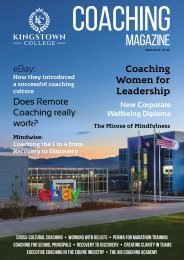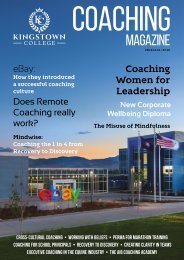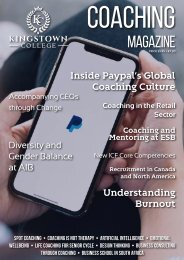Kingstown College Coaching Magazine vol.5 2019/2020
Welcome to another information filled publication of our Coaching Magazine!
Welcome to another information filled publication of our Coaching Magazine!
- No tags were found...
Create successful ePaper yourself
Turn your PDF publications into a flip-book with our unique Google optimized e-Paper software.
www.kingstowncollege.ie
9
The role of empathy and apology in the
process of forgiveness as well as their link to
each other were based on the hypotheses
that “the relationship between receiving an
apology from and forgiving one’s offender
is a function of increased empathy for the
offender” in a study done by McCullough
and colleagues (McCullough, Worthington, &
Rachal, 1997).
There is a proven link to gratitude and
forgiveness. Practicing gratitude has been
consistently linked to greater wellbeing in
a study done by Emmons and McCullough,
where it was measured by mood, coping
behaviors, health behaviors, physical
symptoms, and overall life satisfaction
appraisals (Emmons & McCullough, 2003).
Since gratitude has been linked to empathy
and empathy was found to have implications
for forgiveness, there is potential that
fostering gratitude could improve one’s
capacity toward forgiveness.
When coaching your clients in this space of
forgiveness I find the teachings from Naikan
helpful.
Naikan is a Japanese word that means
“looking inside,” though a more poetic
translation might be “seeing oneself
with the mind’s eye.” It is a structured
method of self-reflection that helps us to
understand ourselves, our relationships,
and the fundamental nature of human
existence.
Naikan was developed in Japan in the
1940s by Ishin Yoshimoto, a devout
Buddhist. Naikan reflections is based on
three questions:
The Three Questions
What have I received from ____?
What have I given to ____?
What troubles and difficulties have I caused ____?
This type of daily reflection is called
daily Naikan (nichijo naikan).
So lets revisit my client who declared
he could never forgive his colleague. I
asked him these three questions having
explained their origin.
What had he received from not forgiving
his colleague?
His reflections here were that what
he was receiving was negative and
upsetting emotions
What had he given to improve this
situation?
My client acknowledged that he, at no
point, had attempted to improve the
situation and acknowledged that, in
fact, he had done the exact opposite.
Taking every opportunity to criticize his
colleague
What troubles and difficulties have
I caused due to my decision not to
forgive?
This part of our coaching session was
extremely emotional for my client. He
became quite upset when he began to
discuss the option of forgiveness. His
belief was deeply entrenched that this
situation could never change. Viewing this
from a different perspective shifted his
view completely of the relationship. When
he began to discuss his colleague from a
compassionate perspective he realised that,
if he approached him, his colleague would
welcome his overtures and work with him
to resolve the situation. Which, in fact, was
exactly what happened.
So, lets celebrate the beauty of the F word
and be compassionate to ourselves and
others by giving the gift of forgiveness as
often as possible.






